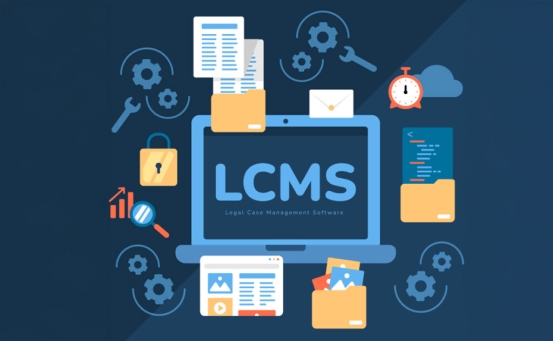Essential Guide to Legal Case Management Software Systems
For legal professionals in the U.S., handling cases, staying on top of client communication, and meeting compliance requirements is becoming increasingly complex. Legal case management software offers a unified solution that streamlines operations, automates routine processes, and boosts productivity—freeing law firms to focus on delivering exceptional client service.
For legal professionals in the U.S., handling cases, staying on top of client communication, and meeting compliance requirements is becoming increasingly complex. Legal case management software offers a unified solution that streamlines operations, automates routine processes, and boosts productivity—freeing law firms to focus on delivering exceptional client service.

What Is Legal Case Management Software?
Legal case management software is a dedicated tool built to help attorneys, support staff, and small law practices organize and oversee cases more effectively. By consolidating all relevant details—such as documents, schedules, deadlines, client communications, and billing—into one system, these platforms simplify workflows, minimize administrative work, and enhance team collaboration.
Core Features of Legal Case Management Software
Document Management – Secure, centralized storage with quick document retrieval.
Calendar & Deadline Control – Tracks hearings, client meetings, and filing dates without missing deadlines.
Billing & Time Tracking – Automates invoices and monitors billable hours in real time.
Client Communication Hub – Keeps all messages with clients and stakeholders in one place.
Task Automation – Handles repetitive processes like generating forms or updating case status.
Compliance Support – Assists with meeting U.S. legal standards, including HIPAA and, for international clients, GDPR.
Why Law Firms Need Legal Case Management Software
Investing in such a platform helps address major challenges while delivering measurable benefits:
1. Increased Efficiency
Automating everyday tasks allows legal teams to dedicate more time to casework.
Example: Industry studies show that automating document preparation can reduce repetitive work time by up to 50%.
Key Benefits: Faster document access, smoother client intake.
2. Better Team Collaboration
Shared files and live updates make it easy for colleagues to work together, even across locations.
Key Benefits: Stronger internal communication, fewer mistakes, and on-time deliverables.
3. Enhanced Client Service
Keeping all client information in one place improves responsiveness and transparency.
Example: Automated reminders ensure clients never miss appointments.
Key Benefits: Stronger client trust, improved satisfaction.
4. Savings in Time & Money
While there may be an upfront cost, the long-term gains in productivity and billing accuracy can be significant.
Key Benefits: Reduced administrative expenses, maximized billable hours.
5. Assured Compliance
Helps law firms follow data privacy laws and avoid costly penalties.
Key Benefits: Secure storage, compliance checklists, reduced legal risks.
Types of Legal Case Management Systems
1. Cloud-Based Platforms
Accessed through a web browser with hosting handled by the provider.
Advantages: Remote accessibility, automatic updates, and secure backups.
Ideal For: Small to medium firms and distributed teams.
2. On-Premise Solutions
Installed on in-house servers managed by the firm’s IT department.
Advantages: Greater control over data and higher customization potential.
Ideal For: Large firms with dedicated tech teams.
3. Free Legal Software
Basic functionality at no cost, suitable for testing or light use.
Advantages: Zero initial investment.
Ideal For: Solo attorneys, small startups.
4. Specialized Practice-Area Tools
Tailored for specific legal niches like family law or IP litigation.
Advantages: Targeted features and compliance support.
Ideal For: Firms with a focused legal specialty.
Leading Legal Case Management Software Options
Software | Standout Features | Monthly Price | Best For |
Clio | Billing, time tracking, docs | $39–$125 | Small to mid-sized firms |
LEAP | Full compliance tools, forms | $95+ | Mid-sized practices |
Actionstep | Custom workflows, cloud-based | $50–$125 | Firms needing tailored setups |
Zola Suite | Built-in email, doc management | $59–$89 | Small firms, startups |
PracticePanther | Client portal, calendar sync | $39–$79 | Solo and small practices |
Competitive Highlights
Clio: Simple interface, integrates well with tools like Google Workspace and Microsoft 365.
Pro: Flexible pricing; Con: Limited advanced customization.
LEAP: U.S.-focused compliance tools and prebuilt forms.
Pro: Rich legal features; Con: Higher subscription cost.
Actionstep: Highly adaptable workflows.
Pro: Suits unique processes; Con: Requires more training.
Zola Suite: Strong on client communication.
Pro: Affordable; Con: Lacks some advanced features for large firms.
How to Select the Right Legal Case Management Tool
Identify Priorities – Pinpoint must-have features like compliance tracking or client portals.
Set a Spending Limit – Find a balance between cost and capability.
Test First – Use trial periods or demos to gauge fit.
Gather Team Input – Ensure it works for everyone who will use it.
FAQs
Is it worth investing in legal case management software?
Yes—streamlined workflows, reduced admin tasks, and better compliance make it cost-effective.
Can small firms afford it?
Many budget-friendly plans and free options are available, such as PracticePanther and entry-level Clio.
Is cloud storage secure?
Trusted vendors use encryption, secure backups, and follow applicable laws.
How long is the setup process?
Usually 2–6 weeks, depending on complexity and firm size.
Can we switch systems later?
Yes, but check migration policies before committing.
Legal case management platforms are reshaping how U.S. law firms operate. By cutting down on repetitive work, improving team communication, and keeping firms compliant, they allow lawyers to focus on what matters most—delivering excellent results for their clients.

